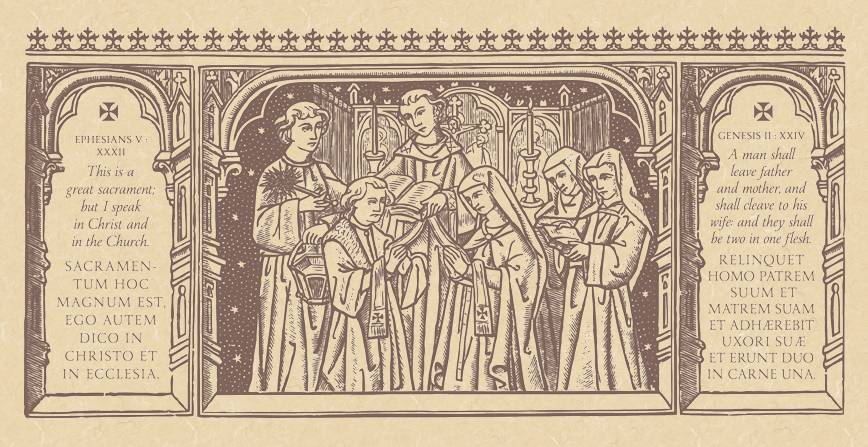Pilgrims in a Foreign Land.
The Nineteenth Friday of Ordinary Time; or, the Memorial of Saint Stephen of Hungary.*
Lessons from the primary feria, according to the ordinary form of the Roman Rite:
• Joshua 24: 1-13.
• Psalm 136: 1-3, 16-18, 21-22, 24.
• Matthew 19: 3-12.
|
When a Mass for the Memorial is taken, lessons from the feria as above, or from the proper:
• Deuteronomy 6: 3-9.
• Psalm 112: 1-9.
• Matthew 25: 14-30.
…or, any lessons from the common of Holy Men & Women for One Saint.
|
The Second Class Feast of Saint Joachim, Confessor & Father of the Blessed Virgin Mary.**
Lessons from the proper, according to the extraordinary form of the Roman Rite:
• Ecclesiasticus 31: 8-11.
• Psalm 111: 9, 2.
• Matthew 1: 1-16.
FatherVenditti.com
|
 5:57 PM 8/17/2019 — All this week and last week we’ve been reading from the historical books of the Old Testament, and if my mind were as agile as it used to be I’d have dived right in and dazzled you with all sorts of esoteric and useless insights. But it isn’t and I didn’t. Regarding our Gospel lesson today, it’s quite clear from the narrative, as it is to common sense, that not everyone is called to a celibate life; and, even if one was prone to debate the value of priestly celibacy in today’s world—which I am not—it’s instructive to see that, in even numbered years, this Gospel lesson is paired with one from Ezekiel, in which the holy Prophet describes an unfaithful Jerusalem as a young woman too captivated by her own charms, flirting with every passing fancy: 5:57 PM 8/17/2019 — All this week and last week we’ve been reading from the historical books of the Old Testament, and if my mind were as agile as it used to be I’d have dived right in and dazzled you with all sorts of esoteric and useless insights. But it isn’t and I didn’t. Regarding our Gospel lesson today, it’s quite clear from the narrative, as it is to common sense, that not everyone is called to a celibate life; and, even if one was prone to debate the value of priestly celibacy in today’s world—which I am not—it’s instructive to see that, in even numbered years, this Gospel lesson is paired with one from Ezekiel, in which the holy Prophet describes an unfaithful Jerusalem as a young woman too captivated by her own charms, flirting with every passing fancy:
But you were captivated by your own beauty, you used your renown to make yourself a harlot, and you lavished your harlotry on every passer-by, whose own you became (Ez. 16: 15 NABRE).
It’s not so much about chastity or celibacy or holy purity—except by analogy—as it is about the need to avoid what the spiritual doctors of a previous age described as “human respect”: conducting our affairs and styling our outward manner so as to be respected by others, even those who do not share our faith. When we do it ourselves we run the risk of side-tracking our eternal salvation for the sake of getting along and fitting in; when it’s done by the Church—such as when the Church takes on secular causes like the environment, thinking that doing so will cause the non-believing strata of society to look upon the Church more favorably—it only serves to confuse and demoralize the faithful.
To live in the midst of this world without being a part of it; to pace out the course of our lives as pilgrims whose journey does not end except in heaven: that is the faith that Jesus challenges us to embrace. There isn't one of us here who hasn't failed to embrace that faith at some point in his or her life; but, thanks be to God, we have a Savior who understands our human condition because He became one. He took our sins upon Himself, and offered Himself as a sacrifice on the altar of the Cross, a sacrifice which we will have reproduced for us upon this altar, and the broken Body of our God will again be offered to us to adore and receive in Holy Communion. That is a great grace, and one that can overcome all our lack of faith, if we will only dispose ourselves to allow it, and replace in ourselves the desire to be accepted with the desire to be saved.

* As the first Christian king of Humgary, Stephen united and Christianized the Magyar people, for which he received the "holy crown" from Pope Sylvester II in the year 1000. Known as the Apostle of Hungary and renowned for his charity to beggers, he died in 1038.
** The holy Patriarch Joachim was the husband of St. Anne and the father of our Lady. This feast, originally kept on March 20th in the Missal of St. Pius V, was tranferred, in the 1962 Missal of Pope St. John XXIII, to the day after the Assumption in order to associate the Blessed Daughter and her holy father in triumph, and rightly so. In this day and age, in which the role of fathers in the raising of children is woefully underrated, this feast was suppressed in the Missal of Pope Bl. Paul VI, with a memorial created for both Joachim and Anne observed on July 26th, the day on which the Missal of John XXIII observes the Feast of St. Anne.
|

